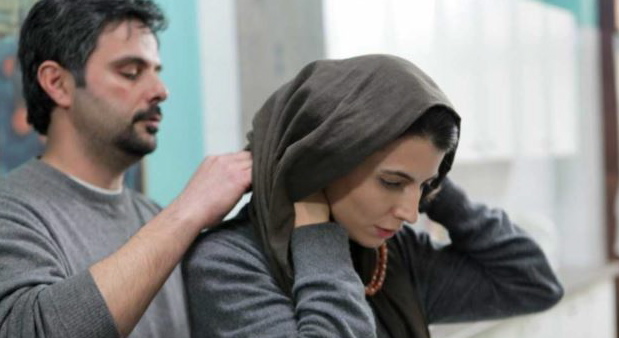 ALI MOSAFFA AND LEILA HATAMI IN THE LAST STEPDeath and the maiden
ALI MOSAFFA AND LEILA HATAMI IN THE LAST STEPDeath and the maiden Narration of this ingenious head trip is divided between an engineer and lifelong depressive, Khosro Shahidi (Ali Mosaffa), who tells us at the beginning that he's dead, and his actress wife Leyli (Leila Hatami of the Best Foreign Oscra winner
A Separation). He is supposed to have died after falling down a stairway he himself designed, miscalculating and making the last taller than the rest. But family friend Dr. Amin (Alireza Aghakhani), is reluctant to sign the death certificate because he has an earlier scar on his temple that's unexplained. Soon we see a scene where Leyli smacks Khosro in the head when in the kitchen and he bleeds and falls. A further flashback shows him being told he has cancer, and "celebrating" by buying a skate board. And before that in the film but later in time of course we've seen him try to skate down a busy Tehran street, at some danger to his life. It seems his impending death has freed him to do fun things like risk getting run over on a skateboard. And later, Dr. Amin emerges as wanting to be an actor, wanting to play Leyli's wife in the film she's making.
Khosro's death might have one of several causes. Woven in with these backwards strands is Leyli's story. She's acting in a film about a husband's death just at the time of Khowro's passing, but insists in going on with it, and rather creepily gets the giggles in a scene and has to stop. She seems like an angel of death, because she keeps flashing on an admirer in Tafresh when she was very young who stood outside paying court to her in the rain and was scorned by her (again she laughed) then immediately died. The filmmaking, a Rivettian obligato to the flashbacks, is noisy and combative. The couple squabbles too. This film is talky and never takes a break and seems on the verge of becoming wearing with its constant new details and flashbacks, but at the end, when the threads are all retied in a new arrangement, it becomes fun. Perhaps the couple alienation here somehow represents the same Iranian impulse worked out more subtly and economically in the Tuscan hills, with a French actress and glossy European cinematography and a more mature, restrained writer-director's hand in Kiarastomi's
Certified Copy.
The Last Step, made under semi mulllah-approved conditions perhaps, is weighed down by the inevitable presence at home of women in long coats and wrapped heads even indoors, yet without a realistic contemporary situation (like
A Separation) to justify them. And thus Mosaffa renounces any interest in confronting contemporary Iranian political and social issues. However, we must acknowledge nonetheless Mosaffa's tour de force in writing, directing, and starring in a film full of complicated staging and multiple secondary characters. Here the dissatisfaction is not political but personal.
Pirandello has been mentioned in the festival blurb, Tolstoy's "Death of Ivan Illych" and Joyce's "The Dead" by Mosaffa himself as influences, aiming high. Some viewers, relishing high art allusions and enjoying puzzle-solving, will enjoy this film. It is certainly sophisticated, haute bourgeois material (about posh, jaded artist-intellectuals), but though it has its occasional amusing, bustling moments, and Leila Hatami (Mosaffa's real-life spouse) has a glow and cheekbones almost worthy of the young Ingrid Bergman or the young Isabella Rossellini, Mosaffa, however influential an actor he may be, has, despite its intricacy, not I think made in this sophomore effort a film quite worthy to be mentioned in the same breath with these other artists and works. In an excellent short Italian review Alessia Starace
notes that Hatami alas fails to act up to the level of Mosaffa, who "Comes out more than well, giving Khosro a truly unexpected range of emotions, from torment to rage, from resignation to irony." But one can't condemn Mosaffa for his ambition. The film has nice moments, and he is clearly one to watch. And mind you, the ingenuity gives pleasure and this is a heck of a head trip. Nicely atmospheric contrast of city and country.
Peleh Akhar (the Farsi title), 88 mins., opened in Iran 11 Feb. 2012, and has shown at some festivals. It won the FIPRESCI Prize at the 2012 Karlovy Vary film festival and Hatami won the Best Actress award. It was screened for this review as part of the San Francisco International Film Festival, where it shows 4,8, and 9 May 2013.
Note: A few days later at Cannes 2013 Ali Mosaffa appeared in Asghar (
The Separation) Farhadi's much admired new film in French,
Le passé (
The Past), with Bérénice Bejo and Tahar Rahim.
Le passé was nominated for the Palme d'Or and won the Prize of the Ecumenical Jury. Bejo won the Best Actress award.





